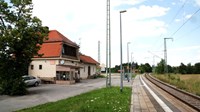
Many minor railway stations in Germany are to become barrier-free, with disabled people in future being able to board and leave trains without needing assistance from others. But not only people who are dependent on wheelchairs or whose vision is seriously impaired will benefit from being able to access trains more easily. Everyday life for pensioners, cyclists and parents with pushchairs will also become easier.
The German Pro-Rail Alliance welcomed the launch of federal transport minister Alexander Dobrindt’s modernisation programme, which will fund measures to make barrier-free access available at minor stations with less than 1,000 passengers daily. A total of 160 million euros for will be invested by 2020 for upgrades to the stations, half of which will be paid for by the federal government.
Barrier-free train stations: many operators have applied for grants
In total, 235 train stations were put forward for the programme, with 108 stations receiving construction grants for making access barrier-free. “The level of demand for this programme shows just how much it was needed. Around 65 percent of all passenger train stations in Germany are small stations and they are all important stopping points in mainly rural areas where the railways form the backbone of the public transport system,” said Dirk Flege, managing director of the Pro-Rail Alliance, on Thursday in Berlin.
What is now needed is a clear commitment from the ministry to continue its financial support for creating barrier-free access at stations beyond 2020. Flege added: “This should not just be a one-off funding measure. Barrier-free access to the railways is a necessity for ensuring that public transport and trains can actually be used by everybody. Many people depend on trains because they cannot, or do not want to, drive a car. In view of demographic developments in Germany it is now time to make preparations.”
List of all stations due to be made barrier-free, by federal state
- Baden-Württemberg: Igersheim, Oberndorf (Neckar), Reicholzheim
- Bavaria: Bernried, Dettingen, Eisenärzt, Furth i. Wald, Hergatz, Marktl. Oberdachstetten, Reuth b. Erbendorf, Saulgrub, Sünching, Untersteinach, Wörth (Isar), Wörth a. Main
- Brandenburg: Ahrensfelde Friedhof, Ahrensfelde Nord, Blumberg (bei Berlin), Groß Pankow, Löwenberg (Mark), Perleberg, Seefeld (Mark), Seelow (Mark), Werneuchen, Wilhelmshorst
- Hesse: Auringen-Medenbach, Bad Arolsen, Baunatal-Guntershausen, Bensheim-Auerbach, Biebesheim, Biedenkopf, Borken (Hess), Bruchköbel, Darmstadt Süd, Fuldatal-Ihringshausen, Gernsheim, Gießen Erdkauter Weg, Groß-Rohrheim, Hadamar, Korbach, Korbach-Süd, Lehnheim, Messel, Oestrich-Winkel, Ostheim (bei Butzbach), Stockstadt (Rhein), Weiterstadt, Wiesbaden-Erbenheim, Wölfersheim-Södel
- Mecklenburg-Vorpommern: Groß Kiesow, Rostock Bramow, Torgelow
- Lower Saxony: Barnten, Börßum, Heidkrug, Hoykenkamp, Knesebeck, Langelsheim, Lengede-Broistedt, Meine, Meinersen, Oker, Sagehorn, Schandelah, Schierbrok, Schöppenstedt, Wahrenholz, Weener
- North Rhine-Westphalia: Blankenheim (Wald), Borgeln, Bösensell, Dahlem, Duisburg-Meiderrich-Ost, Essen-Horst, Gevelsberg-Kipp, Honrath, Hörstmar (Lippe), Maria Veen (Reken), Reken, Sylbach (Ortsteil von Bad Salzufen/Holzhausen)
- Rhineland Palatinate: Brachbach, Eisenbach-Matzenbach, Hirschhorn (Pfalz), Kamp-Bornhofen, Mayen Ost, Niedermohr, Obernhof (Lahn), Pfalzel, Schweich (DB), Steinwenden, Thaleischweiler-Fröschen, Untersulzbach
- Saarland: Bexbach, Bubach, Eppelborn
- Saxony: Großröhrsdorf, Neugersdorf
- Saxony-Anhalt: Bad Kösen, Calbe (Saale), Meitzendorf, Profen, Schkopau
- Schleswig-Holstein: Garding, Süderbrarup, Tönning
- Thuringia: Sondershausen, Zella-Mehlis
Source: Deutsche Bahn AG
Background: modernisation programme for railway stations
In July 2015, the Federal Ministry of Transport and Digital Infrastructure (BMVI) launched a modernisation programme for railway stations in rural areas, with the federal government making 80 million euros available for creating barrier-free access at minor railway stations with less than 1,000 passengers daily. The federal states proposed stations that should receive grants. A German association for the disabled was also involved in selecting the stations. Half of the total costs of the construction measures will be paid for by the German government, with local authorities being responsible for the rest.
According to Deutsche Bahn AG information (2015) there are around 5,4000 railway stations in Germany that are managed by its subsidiary DB Station and Service AG. Of these, around 3,500 (65 percent) are frequented by less than 1,000 passengers daily. The majority of these stations are in Bavaria (594 stations) followed by Baden-Württemberg (394), North Rhine-Westphalia (332), Saxony (327) and the Rhineland Palatinate (318).
About Allianz pro Schiene
Allianz pro Schiene e.V. (The Pro-Rail Alliance) is the German alliance for the promotion of environmentally friendly and safe rail transport. It is an independent umbrella organisation that unites non-profit organisations and the commercial sector for the purpose of lobbying on behalf of the railways.




Comments
There are no comments yet for this item
Join the discussion